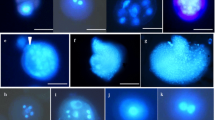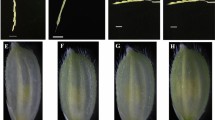Abstract
Microspore embryogenesis is an effective method of obtaining double haploid (DH) lines in only 1 year. However, the microspore embryogenesis protocol was not efficient in pakchoi. This study aimed to establish an effective microspore culture protocol in pakchoi for hybrid breeding. The embryos were obtained from three genotypes (18SY01, 18SY02, 18SY03), but the frequency of microspore embryogenesis was significantly different. Globular embryos from three genotypes were placed into a rotary shaker (50 r/min, 25 ℃) for further culture to improve microspore embryogenesis and plantlet regeneration without callus development. Shake culture not only increased the frequency of cotyledonary embryos but also accelerated microspore embryogenesis in the NLN-13 liquid medium. Moreover, the doubled haploid rates of regenerated plants for the three genotypes were above 50%. The morphological characters and plot yield of DH lines were identified, and there were significant differences between them. According to the measurement of the self-compatibility index, all the DH lines were self-incompatible. Furthermore, the hybrid combination was prepared with the selected DH lines and the pakchoi genic male sterile line GMS010 to develop excellent hybrids. This work contributes to accelerating the application of microspore embryogenesis and supplying the DH lines in pakchoi hybrid breeding.




Similar content being viewed by others
Abbreviations
- DH:
-
Doubled haploid
- NAA:
-
1-Naphthylacetic acid
References
Abraha E, Bechyn M, Klíma M, Vyvadilová M (2008) Analysis of factors affecting embryogenesis in microspore cultures of Brassica carinata. Agric Trop Subtrop 41:53–59
Babbar SB, Agarwal PK, Sahay S, Bhojwani SS (2004) Isolated microspore culture of Brassica: an experimental tool for developmental studies and crop improvement. Indian J Biotechnol 3:185–202
Bao ML, Fu Y, Zhang PJ, Feng H (2011) Techniques for isolated microspore culture in yellow heading spring Chinese cabbage. J Shenyang Agric Univ 42:417–421
Bhatia R, Dey SS, Sood S, Sharma K, Parkash C, Kumar R (2017) Efficient microspore embryogenesis in cauliflower (Brassica oleracea var. botrytis L.) for development of plants with different ploidy level and their use in breeding program. Sci Hortic 216:83–92. https://doi.org/10.1016/j.scienta.2016.12.020
Bhatia R, Dey SS, Parkash C, Sharma K, Sood S, Kumar R (2018) Modification of important factors for efficient microspore embryogenesis and doubled haploid production in field grown white cabbage (Brassica oleracea var. capitata L.) genotypes in India. Sci Hortic 233:178–187. https://doi.org/10.1016/j.scienta.2018.01.017
Bhowmik P, Dirpaul J, Polowick P, Ferrie AMR (2011) A high throughput Brassica napus microspore culture system: influence of percoll gradient separation and bud selection on embryogenesis. Plant Cell, Tissue Organ Cult 106:359–362. https://doi.org/10.1007/s11240-010-9913-3
Cao MQ, Charlot F, Doré C (1990) Embryogenesis and plant regeneration in sauerkraut cabbage (Brassica oleracea L. Subsp. capitata) by in vitro culture of isolated microspores. Acad Paris Ser 310:203–209
Chen JL, Beversdorf WD (1990) A comparison of traditional and haploid-derived Breeding populations of oilseed rape (Brassica napus L.) for fatty acid composition of the seed oil. Euphytica 51:59–65. https://doi.org/10.1007/BF00022893
Chen W, Zhang Y, Ren J, Ma YY, Liu ZY, Feng H (2019) Effects of methylene blue on microspore embryogenesis and plant regeneration in ornamental kale (Brassica oleracea var. acephala). Sci Hortic 248:1–7. https://doi.org/10.1016/j.scienta.2018.12.048
Dai SH, Shi XP, Fu CZ, Bao MZ (2009) Improvement of isolated microspore culture of ornamental kale (Brassica oleracea var. acephala): effects of sucrose concentration, medium replacement, and cold pre-treatment. J Hortic Sci Biotechnol 84:519–525. https://doi.org/10.1080/14620316.2009.11512559
Feng H, Yang S, Wang CN, Fu Y (2009) Obtaining and utilization of DH lines in pakchoi (Brassica rapa L. ssp. chinensis L.). Sci Agric Sin 42:3195–3202. https://doi.org/10.3864/j.issn.0578-1752.2009.09.022
Ferrie AMR, Caswell K (2011) Isolated microspore culture techniques and recent progress for haploid and doubled haploid plant production. Plant Cell, Tissue Organ Cult 104:301–309. https://doi.org/10.1007/s11240-010-9800-y
Gamborg OL, Miller RA, Ojima K (1968) Nutrient requirements of suspension cultures of soybean root cells. Exp Cell Res 50:151–158. https://doi.org/10.1016/0014-4827(68)90403-5
Gland A, Lichter R, Schweiger HG (1988) Genetic and exogenous factors affecting embryogenesis in isolated microspore cultures of Brassica napus L. J Plant Physiol 132:613–617. https://doi.org/10.1016/S0176-1617(88)80264-5
Hansen M, Svinnset K (1993) Micropore culture of Swede (Brassica napus ssp. rapifera) and the effects of fresh and conditioned media. Plant Cell Rep 12:496–500. https://doi.org/10.1007/BF00236094
He HJ, Wang XW, Wang BL (2004) Embryogenesis and plant regeneration of Chinese kale via isolated microspore culture. Acta Hortic Sin 31:239–240
He ML, Xie XY, Zhang N (2018) Synergistic effect of sodium nitrophenolate on paclobutrazol and dimethylpiperidinium choride in foxtail millet germination. J Shanxi Agric Sci 46:339–343
Jia JX, Zhang Y, Cui LW, Feng H (2019) Effect of thidiazuron on microspore embryogenesis and plantlet regeneration in Chinese flowering cabbage (Brassica rapa. var. parachinenis). Plant Breed 138:916–924. https://doi.org/10.1111/pbr.12738
Jiang WS, Yao QJ, Zhang XW, Yuan YX, Geng JF (2008) Influence of activated charcoal and agitation culture on frequency of embryogenesis from microspore of Chinese cabbage. China Cucurbits Vegetables 4:1–3. https://doi.org/10.16861/j.cnki.zggc.2008.04.001
João SD, Maria CC (2002) Effect of medium renovation and incubation temperature regimes on tronchuda cabbage microspore culture embryogenesis. Sci Hortic 93:205–214. https://doi.org/10.1016/S0304-4238(01)00334-X
Kott LS, Polsoni L (1988) Autotoxicity in isolated microspore culture of Brassica napus. Can J Bot 66:1665–1670. https://doi.org/10.1139/b88-227
Lantos C, Szandra P, Katalin A, Bernadett L, Lajos B, Krisztina B, Ferenc B, János P (2019) Utilization of in vitro anther culture in spelt wheat breeding. Plants 8:436. https://doi.org/10.3390/plants8100436
Li Q, Chen Y, Yue F, Qian W, Song H (2018) Microspore culture reveals high fitness of Brassica napus-like gametes in an interspecific hybrid between Brassica napus and Brassica oleracea. PLoS One 13:1–11. https://doi.org/10.1371/journal.pone.0193548
Lichter R (1982) Induction of haploid plants from isolated pollen of Brassica napus. Zeitschrift Pflanzen Physiol 105:427–434. https://doi.org/10.1016/S0044-328X(82)80040-8
Lichter R (1989) Efficient yield of embryoids by culture of isolated microspores of different Brassicaceae species. Plant Breed 103:119–123. https://doi.org/10.1111/j.1439-0523.1989.tb00359.x
Liu F, Mo DF, Yao L, Zhang YY, Zhang FL, Cao MQ (2001) Effects of genetic background of the donor plants and AC on microspore embyrogenesis ability (MEA) of Chinese cabbage. J Agric Biotechnol 9:297–300
Mineykina A, Shumilina D, Bondareva L, Soldatenko A, Domblides E (2020) Effect of beta-lactam antibiotics on microspore embryogenesis in Brassica species. Plants 9:1–10. https://doi.org/10.3390/plants9040489
Niu LJ, Shi FY, Feng H (2018) Efficient doubled haploid production in microspore culture of Zengcheng flowering Chinese cabbage (Brassica campestris L. ssp. chinensis Makino var. utilis Tsen et Lee). Sci Hortic 245:57–64. https://doi.org/10.1016/j.scienta.2018.09.076
Polsoni L, Knott LS, Berersodorf WD (1988) Large-scale microspore culture technique for mutation selection studies in Brassica napus. Can J Bot-Revue Can De Bot 66:1681–1685
Sato T, Nishio T, Hirai M (1989) Plant regeneration from isolated microspore cultures of Chinese cabbage (Brassica campestris L. ssp pekinensis). Plant cell reports 8:486. https://doi.org/10.1007/BF00269055
Shmykova NA, Shumilina DV, Suprunova TP (2016) Doubled haploid production in Brassica L. species. Russian Journal of Genetics: Applied Research 6:68–77. https://doi.org/10.1134/S2079059716010123
Shmykova NA, Domblides E, Vjurtts T, Domblides A (2020) Haploid embryogenesis in isolated microspore culture of carrots (Daucus carota L.). Life 11:1–17. https://doi.org/10.3390/life11010020
Shumilina DV, Shmykova NA, Bondareva LL, Suprunova TP (2015) Effect of genotype and medium culture content on microspore-derived embryo formation in Chinese cabbage (Brassica rapa ssp. chinensis). Biology Bulletin 42:302–309. https://doi.org/10.1134/S1062359015040135
Takahashi Y, Yokoi S, Takahata Y (2012) Effects of genotypes and culture conditions on microspore embryogenesis and plant regeneration in several subspecies of Brassica rapa L. Plant Biotechnol Rep 4:297–304. https://doi.org/10.1007/s11816-012-0224-5
Tang B, Tao L, Lu S, Yang J, Wu KY, Zhang L, Deng Y (2017) Optimization of high frequency embryo induction system for Isolated microspore culture in Chinese cabbage. Chin J Trop Crop 38:1913–1920. https://doi.org/10.3969/j.issn.1000-2561.2017.10.023
Wang Y, Yan TY, Fei L, Zhang Y, Zhang J, Feng J, Fen H (2011) High frequency plant regeneration from microspore-derived embryos of ornamental kale (Brassica oleracea L. var. acephala). Sci Hortic 130:296–302. https://doi.org/10.1016/j.scienta.2011.06.029
Winarto B, Teixeira da Silva JA (2011) Microspore culture protocol for Indonesian Brassica oleracea. Plant Cell, Tissue Organ Cult 107:305–315. https://doi.org/10.1007/s11240-011-9981-z
Würschum T, Tucker MR, Maurer HP, Leiser WL (2015) Ethylene inhibitors improve efficiency of microspore embryogenesis in hexaploid triticale. Plant Cell, Tissue Organ Cult 122:751–757. https://doi.org/10.1007/s11240-015-0808-1
Yang S, Liu XL, Ying F, Zhang X, Li YF, Liu ZY, Feng H (2013) The effect of culture shaking on microspore embryogenesis and embryonic development in Pakchoi (Brassica rapa L. ssp. chinensis ). Sci Hortic 152:70–73. https://doi.org/10.1016/j.scienta.2013.01.019
Yazdi EJ, Falk KC, Séguin SG (2013) Improvement in efficiency of microspore culture to produce doubled haploid lines of Ethiopian mustard. In Vitro Cell Dev Biol 49:682–689. https://doi.org/10.1007/s11627-013-9560-6
Yu WJ, Hou XL, Zhao XM, Liu ZK (2013) Isolated microspore culture and plant regeneration in Brassica campestris L. ssp. Chinensis Makino var. communis Tsen et Lee. J Nanjing Agric Univ 36:7–12
Yuan S, Su Y, Liu Y, Li Z, Fang Z, Yang L, Zhuang M, Zhang Y, Lv H, Sun P (2015) Chromosome doubling of microspore-derived plants from cabbage (Brassica oleracea var. capitata L.) and broccoli (Brassica oleracea var. italica L.). Front Plant Sci 6:1–10. https://doi.org/10.3389/fpls.2015.01118
Zeng XL, Fang SG, Zhu ZH, Zhong KQ (2014) Isolated microspore culture and plant regeneration in flowering Chinese cabbage. Chin J Trop Crops 35:2397–2402
Zhang W, Fu Q, Dai XG, Bao MZ (2008) The culture of isolated microspores of ornamental kale (Brassica oleracea var. acephala) and the importance of genotype to embryo regeneration. Sci Hortic 117:69–72. https://doi.org/10.1016/j.scienta.2008.03.023
Zheng YJ, Zhang YT, Liu HC, Li YM, Liu YL, Hao YW, Lei BF (2018) Supplemental blue light increases growth and quality of greenhouse pakchoi depending on cultivar and supplemental light intensity. J Integr Agric 17:2245–2256. https://doi.org/10.1016/S2095-3119
Zhou Y, Feng H, Wang CN, Liu R (2006) Isolated microspore culture and plantlet formation in Chinese cabbage (Brassica campestris ssp. pekinensis). J Shenyang Agric Univ 37:816–820
Zhou FH, Zuo JH, Gao LP, Sui Y, Wang Q, Jiang AL, Shi JY (2019) An untargeted metabolomic approach reveals significant postharvest alterations in vitamin metabolism in response to LED irradiation in pakchoi (Brassica campestris L. ssp. chinensis (L.) Makino var. communis Tsen et Lee). Metabolomics 15:1–11. https://doi.org/10.1007/s11306-019-1617-z
Acknowledgements
This work was supported by the National Natural Science Foundation of China (31972404), China Agriculture Research System (CARS-23), and Science Study Foundation of Liaoning (LJKZ0640).
Author information
Authors and Affiliations
Corresponding author
Ethics declarations
Consent for publication
This manuscript has not been published or presented elsewhere in part or in entirety and is not under consideration by another journal. The study design was approved by the appropriate ethics review board. We have read and understood your journal’s policies, and we believe that neither the manuscript nor the study violates any of these.
Competing interests
The authors declare no competing interests.
Additional information
Communicated by Handling Editor: Peter Nick
Publisher's note
Springer Nature remains neutral with regard to jurisdictional claims in published maps and institutional affiliations.
Rights and permissions
Springer Nature or its licensor holds exclusive rights to this article under a publishing agreement with the author(s) or other rightsholder(s); author self-archiving of the accepted manuscript version of this article is solely governed by the terms of such publishing agreement and applicable law.
About this article
Cite this article
Fang, S., Ma, Y., Liu, Z. et al. Successful application of microspore culture in pakchoi (Brassica campestris L. ssp. chinensis Makino var. communis Tsen et Lee) for hybrid breeding. Protoplasma 260, 545–555 (2023). https://doi.org/10.1007/s00709-022-01803-9
Received:
Accepted:
Published:
Issue Date:
DOI: https://doi.org/10.1007/s00709-022-01803-9




